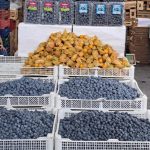The current, more humid and hot weather due to El Nino, the El Nino phenomenon has a negative impact on the production of blueberries for Peru in 2023/24. farmers and the body that regulates industry Proarandanos are warning that they will most likely not experience records this year.
Photograph: Luis Miguel. Blueberries are sold at an artisanal marketplace in Peru.
As per Luis Miguel Vegas, manager of Peru’s blueberry organization Proarandanos their primary variety Ventura is severely affected. The team is also evaluating how much less the production are going to be following a new harvest update due.
“The temperatures this year, which is between four and five degrees Celsius over the norm was a major factor in the rate of production of blueberries particularly on some kinds. One of the ones most affected is a variety that traditionally has accounted for 35% of the exports. There are many others that are during their initial year of production, that are receiving a positive response, despite the warmer weather. This year Peru anticipates a reduction in its production capacity, but we’ll keep offering the most important product to meet the market, aided by the variety of cultivars as well as some newly introduced varieties and the producing regions. It is possible to expect lower amount this time around, however with regards to quality, the Peruvian offering is sure to keep pleasing the market,” Miguel explains. Miguel.
The most recent blueberry export data for Peru to China for the week 33 (14-20 August 2023) has the drop of 73% in exports made to China in comparison to similar times the previous year. In total, 37% less has been shipped to China in the 2023-2024 timeframe. Blueberry exports from Peru for all markets until week 33 are 76% less from last year’s levels and are the overall decline is 36%.
Photograph: Luis Miguel.
An important blueberry producer Exporter and producer from Peru advises the market by saying: “It is important to be aware that blueberries are scarce in Peru. Markets should be aware of this to stay clear of firms that believe Peru could have a massive crop. That is far from the truth. If we can get to 2021’s numbers, we’ll be in good shape.”
For his daily obligations, Miguel is on the road all over Peru in order to explore every blueberry farm possible. “Last week, I had an opportunity to tour farms in northern Peru beginning in Paita and heading to the south, ending in Trujillo. This is a total of six farms over three days. It was more than 1,000 kilometers of experiencing different kinds and sizes of operation. It was great for me to be in the “court” and observe the progress of the campaign and sharing our experiences with experts on the ground, during the midst of a challenging campaign because of temperatures that were hotter than usual,” stated Miguel.
More information is available here:
Luis Miguel Vegas
Proarandanos
Tel: +51 980 503 363
Email: contacto@proarandanos.pe
www.proarandanos.org
